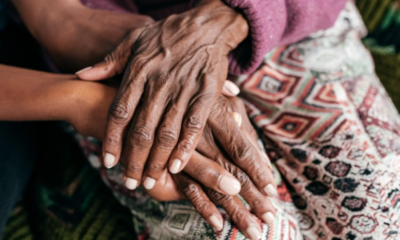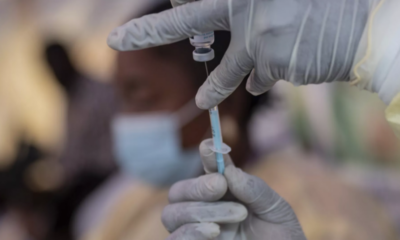Health
Experts Call for Overhaul in Obesity Diagnosis Amid Criticism of BMI Reliance
Global health experts have called for a fundamental reevaluation of how obesity is diagnosed, urging a shift from the long-standing reliance on body mass index (BMI) to a more nuanced and individualized approach. The recommendations come from a panel of 56 specialists and patients, who published their findings in The Lancet Diabetes & Endocrinology.
A Complex Condition
Obesity, affecting roughly one in eight people worldwide, is a risk factor for numerous health conditions, including type 2 diabetes, cardiovascular disease, and certain cancers. However, experts argue that it is not always synonymous with ill health. The commission has proposed distinguishing between clinical obesity, a chronic disease marked by organ dysfunction or physical limitations caused by excess fat, and preclinical obesity, where individuals have obesity but maintain normal organ function.
“There are some people who have obesity and manage to live a relatively normal life … and on the other hand, you have [people] who may suffer significant health issues due to obesity alone,” said Dr. Francesco Rubino, the commission’s chair and a professor at King’s College London.
BMI Under Fire
BMI, a measure derived from a person’s weight and height, has been the primary diagnostic tool for obesity since the World Health Organization adopted it in the 1990s. A BMI of 30 or higher classifies an adult as obese. While BMI offers a simple proxy for body fat and related health risks, critics say it is flawed and outdated.
“It’s not just how much fat you have, it’s also where the fat is that’s important,” said Dr. Adam Collins, a nutrition expert at the University of Surrey. He highlighted that BMI does not account for fat distribution or differentiate between fat and muscle mass, leading to potential misclassifications.
Athletes with high muscle mass, for example, may fall into the obese category despite being in excellent health.
A New Framework
The commission has recommended that BMI remain a preliminary screening tool but that an official diagnosis of clinical obesity should involve more comprehensive criteria. These include signs such as obesity-induced breathlessness, heart failure, and joint pain, among others.
Adopting this approach could reduce overdiagnosis and ensure medical care is tailored to an individual’s health needs rather than focusing solely on weight loss. This shift is especially crucial as governments debate how to allocate resources, such as expensive weight-loss drugs like Wegovy and Mounjaro, which are in limited supply.
Changing Perspectives
Beyond medical practice, experts hope the new framework will combat the stigma around obesity and promote better understanding of metabolic health for people of all sizes. “This leads to a change in practice and, maybe even before that, a change in mindsets,” Rubino said.
Though it may take time to implement these changes, advocates believe this step could reshape how obesity is perceived and treated globally.
Health
Climate Change Poses Growing Threat to Blood Supply and Demand, Australian Study Warns
Climate change is poised to significantly disrupt both the supply and demand of blood for transfusions, according to a new study conducted by researchers from Red Cross Lifeblood and the University of the Sunshine Coast (UniSC). Published in The Lancet Planetary Health, the study outlines how increasing temperatures, extreme weather events, and the spread of infectious diseases could upend the current blood donation system.
The research highlights a dual threat: a shrinking pool of eligible blood donors due to health impacts and climate-induced disruptions, coupled with a rising demand for blood in disaster and disease-stricken areas.
“Climate change may impact some infectious diseases that can be transmitted via blood and can prevent people from donating,” said Dr. Elvina Viennet, one of the study’s co-authors. She emphasized that blood-borne illnesses such as Dengue Fever, West Nile Virus, and Malaria—driven by rising temperatures and increased rainfall—are becoming more prevalent in regions like Europe, affecting donor eligibility.
Currently, an estimated 25 million blood units are transfused each year across Europe. Blood is essential for a wide range of medical treatments, including surgeries, trauma care, managing chronic conditions, and supporting premature infants. However, disruptions in donor availability or blood storage due to climate extremes could pose serious risks.
“Extreme weather events can limit the mobility of people, disrupt transportation networks, and compromise blood storage conditions,” Viennet added. “This is particularly concerning because blood has a short shelf life and requires carefully regulated conditions.”
Helen Faddy, associate professor at UniSC and the study’s lead author, noted that climate-related health issues may further limit the pool of potential donors. “We could see new diseases emerge, and other health challenges such as blood pressure changes, dehydration from heatwaves, and psychological distress linked to climate anxiety that may affect individuals’ ability to donate,” she said.
Moreover, the study warns that the need for blood transfusions could also increase. Factors such as pregnancy complications, cardiovascular disease, and the rising incidence of sickle cell disease—conditions potentially exacerbated by climate change—may drive higher demand.
To mitigate these risks, the researchers propose several strategies, including the development of flexible and mobile blood collection centers, the use of cell salvage or autotransfusion techniques, and enhanced international collaboration to ensure a resilient and diverse blood supply.
“With rising sea levels and climate-related displacement likely to increase global migration, it’s vital to boost blood donation from a wider range of ethnic backgrounds,” Faddy stressed. “Encouraging more people to donate blood is a public health priority as climate impacts grow.”
The study serves as a call to action for health authorities worldwide to adapt blood donation systems in the face of escalating environmental challenges.
Health
EU Sees Record Surge in Harmful Consumer Products in 2024, Chemicals at Core of Concerns
A record number of potentially dangerous consumer products were flagged across the European Union in 2024, with toxic chemicals emerging as a significant concern, according to a new report by the European Commission.
The findings, released through the EU’s Safety Gate Rapid Alert System, recorded over 4,100 alerts last year — the highest number reported in two decades. The system, which tracks threats in consumer and professional goods, excludes food and pharmaceuticals but covers a wide range of products, from cosmetics and clothing to toys and electronics.
The report identified several hazardous substances, including banned fragrances, heavy metals, and so-called “forever chemicals” that remain in the environment and the human body for extended periods. These substances pose serious health risks ranging from skin irritation and reproductive damage to long-term cognitive effects in children.
Banned Fragrance in Cosmetics
One of the most commonly detected substances was a synthetic fragrance known as 2-(4-tert-butylbenzyl) propionaldehyde (BMHCA), also listed as butylphenyl methylpropional. This chemical, which emits a floral scent similar to lily of the valley, was found in nearly all cosmetics reported for chemical risk.
BMHCA has been banned in EU cosmetics since March 2022 due to evidence linking it to skin irritation, fertility issues, and potential harm to unborn children. Despite the ban, it continues to appear in perfumes, deodorants, lotions, and hair products, raising concerns about enforcement and product safety.
Dangerous ‘Forever Chemicals’
The report also highlighted the presence of short-chain chlorinated paraffins (SCCPs) in items like cables and rubber-based products. SCCPs fall under the category of PFAS—per- and polyfluoroalkyl substances—often dubbed “forever chemicals” due to their extreme resistance to environmental breakdown.
Although the import and use of SCCPs are heavily regulated in the EU, these substances were still detected in several products. Research indicates that SCCPs can damage the liver and kidneys, disrupt hormones, and affect child development. The report also warned of their toxicity to aquatic life and potential to accumulate in the food chain.
Lead Exposure Remains a Risk
Another alarming discovery was the toxic metal lead in solders used for bonding metal parts. Even minimal exposure to lead is considered unsafe, with the World Health Organization noting that it can damage the brain, kidneys, and cardiovascular system. Lead is particularly harmful to children and pregnant women, with links to developmental delays, reduced IQ, and behavioral disorders such as ADHD.
An estimated 2.5 million children and adolescents in Western Europe have blood lead levels at or above five micrograms per decilitre — a threshold associated with multiple health issues.
Growing Health and Environmental Concerns
The European Commission’s report underscores the need for stricter enforcement of safety regulations and increased consumer awareness. It also calls on manufacturers and importers to prioritize non-toxic materials and improve product traceability to ensure compliance with EU safety standards.
As concerns about chemical exposure and environmental toxicity grow, the report highlights the urgent need for coordinated efforts to protect public health and the environment from harmful consumer products.
Health
Experts Warn Against Viral TikTok Weight Loss Trends
Misleading weight loss trends are taking social media by storm, with millions of TikTok users sharing and trying out DIY hacks that promise rapid results without leaving home. However, health experts are raising concerns about their effectiveness and potential harm.
Among the most popular weight loss fads currently trending on TikTok are the castor oil belly rub and the coffee with lemon drink. These viral methods have racked up tens of thousands of likes and views, but health professionals caution that their benefits are overstated—and in some cases, entirely fictional.
The castor oil trend involves rubbing the oil, derived from castor beans, onto the stomach with claims that it can flatten the belly within weeks. A single TikTok post promoting this method has garnered over 49,000 likes.
However, Priya Tew, a specialist dietitian and spokesperson for the British Dietetic Association, dismissed the claims. “There is no proof that applying castor oil can affect your internal fat or aid in weight loss,” she said. “It’s essentially just moisturizing your skin.”
Dr. Adam Collins, Professor of Nutrition at the University of Surrey, agreed. “There’s no metabolic reason for castor oil to impact visceral fat. These claims are simply not based on science.”
Another enduring trend is adding lemon to coffee, which surged in popularity in 2024 and remains widely shared in 2025. Supporters suggest the mixture boosts metabolism and fat burning due to caffeine’s natural stimulant effects.
But experts say that while caffeine can slightly increase metabolism, the impact is minimal. “It’s not like you’ll suddenly burn hundreds more calories,” said Dr. Collins. “And high doses of caffeine can lead to other health issues.”
Dr. Christophe Matthys, professor of Human Nutrition at KU Leuven, warned of additional risks. “Overconsumption of caffeine can affect sleep and disrupt hunger cues, leading to overeating,” he explained. “That can actually work against weight loss goals.”
Beyond physical health, experts are also worried about the psychological toll these trends may have, especially on younger audiences. “People can develop distorted relationships with food,” said Matthys. “These ideas often aren’t based on any scientific understanding but can leave lasting mental effects.”
Tew emphasized that sustainable weight loss comes from consistent, manageable changes—not viral shortcuts. “Adding a portion of fruit, snacking on nuts instead of crisps—these are the kinds of small changes that make a long-term difference,” she said.
Importantly, she also stressed that weight isn’t the only—or best—indicator of health. “We can be healthy in all shapes and sizes. Being in a larger body doesn’t necessarily mean you’re unhealthy or need to lose weight,” she added.
As TikTok continues to shape wellness conversations, experts urge users to be critical of trends and to seek evidence-based advice when it comes to their health.
-

 Business11 months ago
Business11 months agoSaudi Arabia’s Model for Sustainable Aviation Practices
-

 Business11 months ago
Business11 months agoRecent Developments in Small Business Taxes
-

 Politics11 months ago
Politics11 months agoWho was Ebrahim Raisi and his status in Iranian Politics?
-

 Business10 months ago
Business10 months agoCarrectly: Revolutionizing Car Care in Chicago
-

 Business10 months ago
Business10 months agoSaudi Arabia: Foreign Direct Investment Rises by 5.6% in Q1
-

 Technology11 months ago
Technology11 months agoComparing Apple Vision Pro and Meta Quest 3
-

 Politics11 months ago
Politics11 months agoIndonesia and Malaysia Call for Israel’s Compliance with ICJ Ruling on Gaza Offensive
-

 Technology11 months ago
Technology11 months agoRecent Developments in AI Ethics in America



























